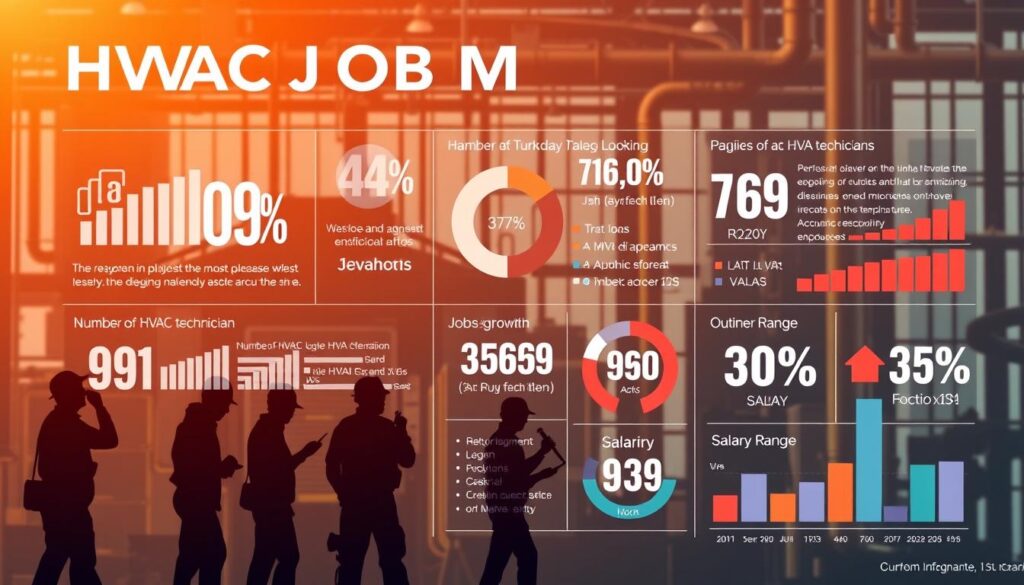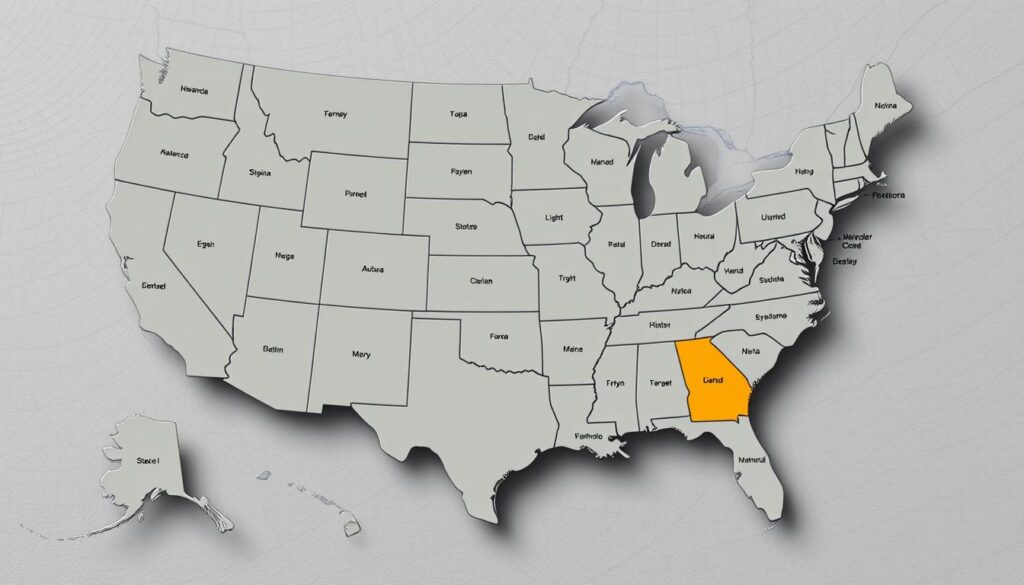How Many HVAC Jobs Are There in the U.S.? Are you curious about the hidden opportunities in the HVAC job market? Imagine a career that offers stability, growth, and lots of chances in a vital industry. The HVAC job market is more than just a job—it’s a smart choice for your future.

The U.S. has about 415,800 HVAC technicians now. And it’s expected to grow even more by 2032. Knowing how many HVAC jobs are available is key for those thinking about this exciting field.
The HVAC job market is not just about numbers. It shows how important these workers are for keeping places comfortable and efficient. HVAC technicians install complex systems and do important maintenance. They are the hidden heroes of our modern world.
Key Takeaways
- 415,800 HVAC technicians currently employed in the U.S.
- Projected 6% industry growth through 2032
- Diverse employment opportunities across multiple sectors
- Steady demand driven by infrastructure and technology needs
- Promising career path with competitive compensation
Table of Contents
Current State of HVAC Employment in America
The HVAC industry is key in the U.S., providing strong job chances and big economic benefits. With growth in hvac employment stats, careers in this field are exciting and changing.
HVAC job demand keeps growing, thanks to new tech and green concerns. Experts predict steady growth for HVAC workers nationwide.
Total Number of Active HVAC Technicians
There’s a big team of HVAC techs in the U.S. Key facts are:
- Projected 6 percent increase in HVAC job openings between 2022 and 2032
- About 10% of techs work for themselves
- The industry makes around $81.1 billion a year in the U.S. economy
Geographic Distribution of HVAC Jobs
HVAC jobs are spread out differently in states. The top five states for HVAC work are:
- California
- Texas
- New York
- Florida
- Illinois
Average Salary Statistics
HVAC salaries vary a lot, depending on experience and where you work. Salary ranges show the field’s growth:
- National average salary: $48,000 a year
- Average hourly wage: $24.57
- Highest hourly wage in Alaska: $39.48
- Lowest hourly wage in Alabama: $18.77
The HVAC industry has great career chances, with jobs in homes, businesses, and factories.
Explore Our HVAC Shop
Looking for top-rated HVAC tools, parts, and accessories? Visit our shop and find the perfect solution for your needs.
Visit the ShopHow Many HVAC Jobs Are There?
The HVAC job market in the United States is growing fast. By 2022, there were 415,800 HVAC technician jobs. This shows a bright future for those who want to work in this field.
Experts say the HVAC job market will keep growing. They predict a 6% increase over the next ten years. This means about 37,000 new HVAC jobs every year.
- Total HVAC jobs in 2022: 415,800
- Projected annual job openings: 37,000
- Career growth rate: 6%
HVAC technician jobs are needed in many areas. These include:
- Residential construction
- Commercial building maintenance
- Industrial facilities
- Automotive industries
- Specialized technical services
Salary is a big plus in this career. New technicians can make about $36,000 a year. Experienced ones can earn up to $82,000. The average salary is $51,390, which is $5,000 more than the national average.
The HVAC industry offers stable employment with diverse opportunities across multiple sectors.
HVAC Industry Market Growth and Projections
The HVAC industry is growing fast, opening up great career chances for those in the field. With big market growth ahead, this career path is very appealing.
Recent studies show the HVAC job market is booming. It’s expected to grow from $65.72 million to $89.11 billion by 2025. This is a 6.28% growth rate.
Market Value Expectations
By 2030, the HVAC market could hit $367.5 billion. This shows how much the industry is expanding. Several factors are driving this growth:
- More people want energy-efficient systems
- New tech in climate control
- More focus on indoor air quality
- Smart home tech is getting bigger
Growth Rate and Industry Drivers
The industry is growing at 3.9% from 2020 to 2030. Smart HVAC technologies are playing a big role. The global smart thermostat market is expected to jump from $1.86 billion in 2019 to $11.36 billion by 2027.
The future of HVAC is bright, with unprecedented opportunities for skilled professionals.
Your chances in this field are huge. HVAC mechanics and installers’ jobs are expected to grow by 9%. This means about 42,500 new job openings every year. This growth ensures a stable and promising career for those in HVAC.
Explore Our HVAC Shop
Looking for top-rated HVAC tools, parts, and accessories? Visit our shop and find the perfect solution for your needs.
Visit the ShopTop States for HVAC Employment Opportunities

The hvac job market in the United States is booming. Florida, California, and Texas lead the way. They offer great job chances for skilled technicians.
Let’s look at the top states for HVAC jobs:
- Florida: 33,210 HVAC technicians employed
- Average hourly wage: $21.85
- Annual salary: $45,450
- Job growth projection: 16% between 2018-2028
- California: 32,410 HVAC technicians employed
- Average hourly wage: $30.56
- Annual salary: $63,560
- Job growth projection: 13% between 2018-2028
- Texas: 28,010 HVAC technicians employed
- Average hourly wage: $23.73
- Annual salary: $49,360
- Job growth projection: 16% between 2018-2028
These states have a strong hvac job market. They have diverse climates, growing populations, and strong economies. Your HVAC career could really take off here.
Thinking about moving or starting your HVAC career? These states are the best places to look. They offer good pay, lots of job openings, and a high demand for HVAC workers.
Explore Our HVAC Shop
Looking for top-rated HVAC tools, parts, and accessories? Visit our shop and find the perfect solution for your needs.
Visit the ShopHVAC Job Market Demand Factors
The HVAC job market is growing fast. This growth comes from several important factors. Knowing these can help you find great opportunities in this key field.
Construction Industry’s Pivotal Role
The construction sector plays a big role in HVAC job demand. About 80 percent of US construction companies say they can’t find enough HVAC techs. This shortage means lots of chances for new professionals.
- New building projects always need HVAC experts
- Renovation and retrofit markets offer more jobs
- Commercial and residential construction keeps jobs steady
Environmental Regulation Influences
Tough environmental rules are changing the HVAC job market. The U.S. Department of Energy says there’s more need for energy-saving systems. This means HVAC techs need to learn new skills.
- EPA certification sets professional standards
- Green tech leads to new HVAC solutions
- Installing energy-efficient systems is now key
Equipment Replacement Cycles
Old HVAC systems are being replaced, which helps jobs grow. The average HVAC pro is 54 years old. This means a lot of new jobs will open up in the next 10 years.
Job growth is expected to be 5.5% from 2022 to 2032. This means there will be 28,200 new HVAC tech jobs. These jobs will come from both new projects and replacing older workers.
Career Prospects and Employment Outlook

The HVAC industry offers great career chances for those looking for a stable and exciting job. With strong hvac job growth projections, technicians have a bright future ahead.
Employment data shows great numbers for HVAC jobs. By 2023, there are 441,200 heating, air conditioning, and refrigeration mechanic jobs in the U.S. The Bureau of Labor Statistics says there will be a 13% growth from 2018 to 2028. This is much faster than the average job market growth.
- Projected job creation: 40,100 new HVAC positions by 2033
- Median annual salary: $57,300 in May 2023
- Highest paying regions:
- District of Columbia: $78,750
- Alaska: $75,380
- Massachusetts: $75,190
New technologies are changing hvac job growth. Smart thermostats, IoT, and energy-efficient systems open up new areas for tech-savvy professionals.
| Certification Type | Career Impact |
|---|---|
| EPA Type I | Small appliance repair specialization |
| NATE Certification | Enhanced employability across equipment types |
| HVAC Excellence Master Certification | Advanced professional recognition |
Your future in HVAC is looking good. With an aging workforce and growing demand for skilled technicians, now is a great time to start a rewarding HVAC career.
Explore Our HVAC Shop
Looking for top-rated HVAC tools, parts, and accessories? Visit our shop and find the perfect solution for your needs.
Visit the ShopRegional HVAC Employment Distribution
Understanding HVAC employment by region is key to seeing job market chances across the U.S. The stats show big differences in job numbers and demand in various areas.
The HVAC job scene is different in Southern and Northern states. Climate and infrastructure greatly affect job chances.
Southern States Employment Landscape
Southern states have unique HVAC job trends. These are driven by certain regional factors:
- 67% of Southern households always use air conditioning.
- More cooling needs lead to more service jobs.
- Florida has the most HVAC technician jobs.
Northern States Job Market Dynamics
Northern areas have their own HVAC job traits:
- There’s a big need for heating system work.
- Seasonal changes affect job chances a lot.
- Skills in winter HVAC systems are in demand.
Regional Employment Comparison
| Region | Employment Level | Average Salary |
|---|---|---|
| Southern States | High Demand | $49,820 – $55,730 |
| Northern States | Moderate Demand | $44,000 – $52,000 |
Your location greatly affects HVAC career chances and what you can specialize in.
HVAC Technician Salary Variations by State
HVAC technician jobs vary a lot by state. Salary differences are big, due to many factors. These factors affect how much you can earn.
Some states pay HVAC pros a lot more than others. For example, California pays an average of $63,920. Texas, on the other hand, pays around $49,900. This shows big differences in salaries across regions.
- Highest paying states for HVAC technicians:
- California: $63,920
- New York: $63,210
- Massachusetts: $64,760
- Lowest paying states for HVAC technicians:
- Florida: $49,280
- Georgia: $49,120
- Arkansas: $41,750
Experience is key to making more money. Entry-level HVAC technicians start at about $52,300 a year. As you get better, your salary can go up a lot. Intermediate technicians make about $63,500, and the most experienced can earn up to $74,500.
Getting better at your job and getting special certifications can really help you earn more.
Many things affect how much you get paid. Where you live, the cost of living, how much demand there is for HVAC services, and how good you are at your job all play a part. Getting more training and skills can help you make more money in this field.
Future Job Creation and Growth Predictions
The HVAC industry is growing fast, opening up great career paths for many in the U.S. Experts predict a big increase in HVAC technician jobs in the next few years.
Here are some key points about the industry’s future:
- The Bureau of Labor Statistics says HVAC technician jobs will grow by 6% from 2022 to 2032.
- About 37,700 new HVAC jobs will open up every year.
- There will be around 28,200 new HVAC jobs in the next decade.
New trends are fueling this growth. Advances in technology, changes in energy laws, and a need for energy-saving systems are creating lots of job chances.
Some areas in HVAC are growing even faster. Green technology and smart home integration are key skills that can boost your career.
The starting pay for HVAC technicians is now over $25 an hour. This makes it a great career for those looking for good pay and job security.
Your chances in this field are huge. With the right training and ability to learn new tech, you can lead in a growing industry with lots of job opportunities.
Explore Our HVAC Shop
Looking for top-rated HVAC tools, parts, and accessories? Visit our shop and find the perfect solution for your needs.
Visit the ShopMarket Factors Affecting HVAC Employment
The HVAC job market is changing fast. Many factors are at play. Knowing these can help you understand the HVAC job landscape better.
Residential Market Demand
Residential HVAC needs are big in the job market. With 75% of US homes having central air, there’s a lot of demand for skilled workers. Key factors include:
- More home renovations
- Old systems needing replacement
- Upgrades for better energy use
Commercial Sector Growth
The commercial HVAC market is booming. Cities use a lot of energy, with most going to heating and cooling buildings.
| Market Segment | Growth Projection |
|---|---|
| Office Buildings | 5.5% Annual Growth |
| Retail Spaces | 6.2% Annual Growth |
| Industrial Facilities | 6.7% Annual Growth |
Technological Advancements
New technologies are changing the HVAC job scene. Efficiency has jumped by 250% in 20 years. This means technicians need new skills.
The future of HVAC employment lies in adapting to innovative, energy-efficient systems.
Those who keep up with tech trends will do well in the HVAC job market.
Conclusion
The HVAC job market is booming, with growth expected to hit 13% by 2028. The market value is set to soar to $89.11 billion in just five years. This growth opens up exciting career paths for those looking for stable and well-paying jobs in HVAC.
The industry faces challenges and opportunities. About 80 percent of construction companies are struggling to find skilled HVAC workers. With an aging workforce, there are many entry points into this field. The US Department of Energy’s support for energy-efficient products also boosts job chances, making training and certifications more important.
To succeed in HVAC, you need to prepare strategically. Invest in specialized training and get certifications like NATE and HVAC Excellence. Stay up-to-date with new technologies. States like Florida, Texas, and California have strong job markets, ready for skilled professionals.
Your future in HVAC looks bright. Technicians earn an average of $49,242, with top earners making up to $68,000. This field offers not just a job but a rewarding career. Keep learning, stay flexible, and you’ll excel in this growing industry.

